Yves here. This post by John Helmer underscores the degree to which Russia approaches war differently than the West. Despite the micro focus and emotion-button-pushing of some Russian commentators, a, arguably the, guiding principle for Russia’s conduct of war is economy of force. From that follows the preference for attritional warfare, the willingness to cede territory to save resources, and a studied indifference to how long things take. Needless to say, this disparity from the US approach leads to regular misinterpretations of the Ukraine campaign.
Helmer translates and reposts an analysis by Yevgeny Krutikov, formerly a military intelligence officer of the GRU, of why the fight for Pavlovka, in southern Donetsk, which has become controversial due to claims of high losses for the Russian side (which are actually small compared to typical Ukraine deaths and casualties) is important as a check on possible Ukraine offensive strategies.
By Yevgeny Krutikov, introduced and translated by John Helmer who has been the longest continuously serving foreign correspondent in Russia. Published at Dances with Bears
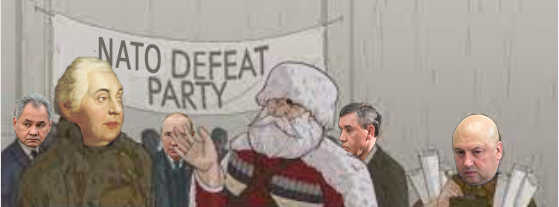
The problem of interpreting the war from the Russian point of view is that the Russian military does not signal its punches, make idle threats, believe its own propaganda, or make money on click bait. The Stavka never leaks.
By contrast, Russian open-source commentators are driven, as is normal in a functioning democracy, by domestic politics. This requires them to disguise or camouflage their support for or opposition to the political and oligarch factions in Moscow with a variety of ploys — attacks on named generals; analyses of the Army’s mistakes; speculation about the negotiations initiated by US officials with their Russian counterparts; warnings of Fifth Columns, stabs in the back, and a shameful peace.
The outcome in Moscow doesn’t exist in any European or North American capital — noisy debate with sharp dividing lines drawn between the factions of patriots (Tsargrad, Vladimir Soloviev); the left (Sergei Glazyev, Mikhail Khazin); the fakes (Yevgeny Prigozhin); the right (Elvira Nabiullina, Alexei Khudrin); the oligarchs (Oleg Deripaska); the puppets (Margarita Simonyan); and so on, not counting the oppositionists in hiding, exile or jail.
Easy to misread Russian military analysis then, because there is so much of it; because the Stavka doesn’t talk to any of them; and because for Russian commentators this is an opportunity for waging their contests for the usual things — power, money, celebrity. You will see criticism of President Vladimir Putin (lead image, 2nd left, rear), therefore, but always under cover of something or somebody else.
This is understandable because he and the war aims are so popular. Public support for Putin is currently ten points higher than it was in January of this year; three points lower than in April; two points higher than in September. There is nothing and no one comparable on the US or NATO side. Since the start of the special military operation on February 24, the Russian president’s approval rating has remained stable within a 4-point variance; that is roughly equal to the pollster’s margin for statistical error. This means that, strategically speaking, most Russians are almost as patient as the Stavka.
By contrast, the politics of the US and NATO side is an impatient, short-term business. A week is a long time in politics, the former British prime minister Harold Wilson once said, correcting Joseph Chamberlain, a nineteenth century predecessor who didn’t quite make it to the prime ministry; Chamberlain said it was two weeks.
Warfare is a longer term business. This war is going to be longer still.
To follow, understand, and anticipate as Russians do requires a form of thinking that can be called byzantine. Not the western meaning of deviousness, but the eastern meaning of the way the thousand-year Byzantine empire was ruled from Constantinople. In our time this starts with the doctrine of economy of force. Cost-effective calculations regulate the deployment of men and materiel, hence the changeable combination and schedule of fixed-wing air attack, helicopter air attack, missiles, drones, and artillery in Russian operations so far. The rules of war of attrition also apply, as do the tactical variables of positional and mobile warfare. By the time these variables are counted up, and multiplied by firepower and deception, this is thinking which goes far beyond games of chess or Go. Situation report maps in publication don’t help much; they are already days old and obsolete.
Marshal Mikhail Kutuzov’s (lead image, left front) strategy of the Golden Bridge, applied successfully against Napoleon, requires allowing the enemy the time and space to retreat and withdraw to his own territory because the cost of annihilating him on Russian territory is much greater and unnecessary. General Winter (centre front) also requires operational patience because the freeze doesn’t always deploy itself when the Russian army wants it. This year, however, it has begun already. Snow has started falling in Kiev; in a week’s time it will be minus 8 degrees Celsius. It remains warmer along the eastern front, and in Kherson.
Russian or byzantine thinking is the antithesis of the shock and awe doctrines of the US and NATO. Their journalists and staff colleges have invented terms to conceal their incomprehension of Generals Sergei Surovikin (front right) and Valery Gerasimov (rear right), and Defence Minister Sergei Shoigu (rear left). But they remain in the dark – as US Army Colonel (retired) Douglas Macgregor keeps trying to point out.
Byzantine thinking can’t be memorised, photocopied, or cribbed. To learn, start with this paradox of imperial impatience first published by C.P. Cavafy in 1904; he called it “Waiting for the barbarians”.
There is also what Russians say they are thinking will come next. Take it as carefully as you read Cavafy. What’s the hurry?
Yevgeny Krutikov was a military intelligence officer of the GRU before he became a journalist for the Moscow internet publication Vzglyad. Last Friday evening he published the following analysis which has been translated without editing. Maps have been added.
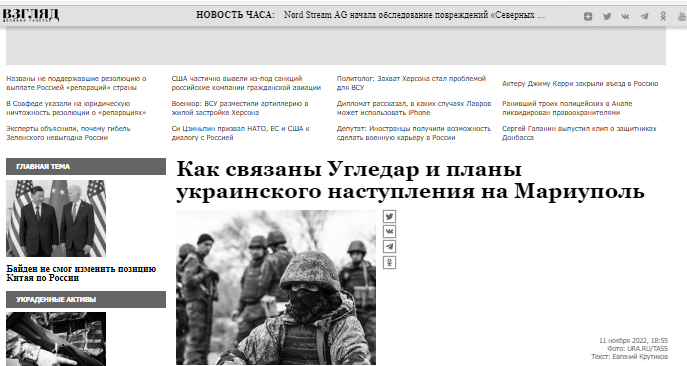
Source: https://vz.ru/
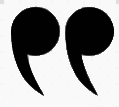 HOW ARE UGLEDAR AND THE PLANS OF THE UKRAINIAN OFFENSIVE AGAINST MARIUPOL CONNECTED
HOW ARE UGLEDAR AND THE PLANS OF THE UKRAINIAN OFFENSIVE AGAINST MARIUPOL CONNECTED
The winter campaign will have its own peculiarities
November 11, 2022
Text: Evgeny Krutikov
The town of Pavlovka, located in the Donbass, has been liberated by Russian troops. At first glance this looks like an insignificant event, especially compared to what is happening in the Kherson region. In fact, these two sections of the front have a direct connection, especially in relation to the upcoming winter campaign.
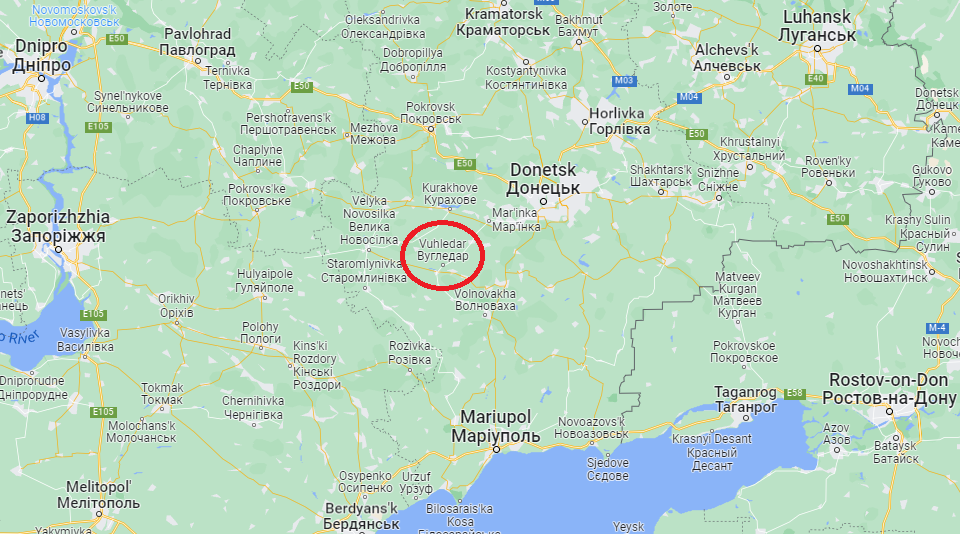
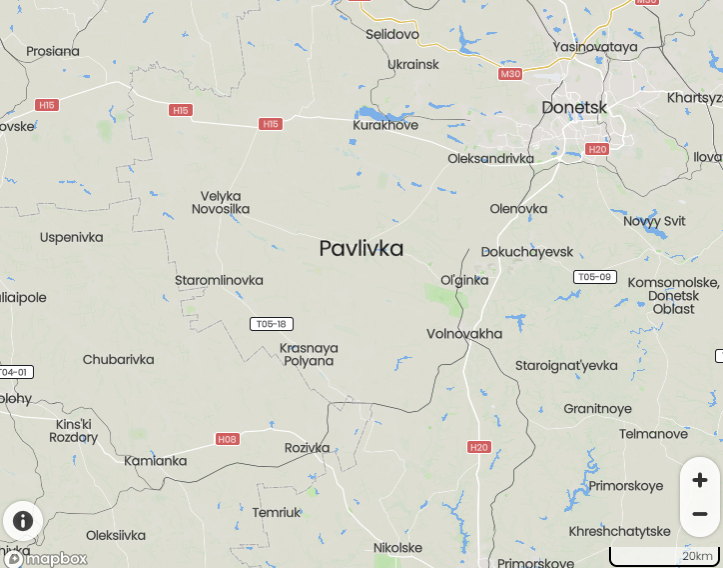
Source of map: https://mapcarta.com/
For video of Russian capture of Pavlovka, see this.
By Friday, November 11, Russian troops finally occupied Pavlovka and began to clean up, including the territory in the direction of Ugledar. Still, a full-fledged attack on Ugledar has not yet been observed.
Near Artemovsk, fighting continues for the suburban settlements, especially Opytnoye, without taking which it is impossible to talk about a further offensive on Artemovsk. About the same story with the battles for Soledar. There are already fighting units in the city, but without control over the suburban villages of Belogorovka (to the north) and Bakhmutsky (to the south), the situation in Soledar will be unclear.
There have been no significant changes in the Avdeyevka direction — there are battles for Opytnoye (not to be confused with the same-named Opytnoye near Artemovsk) and Vodyanoye; Pervomaiskoye is being cleaned out. A slight advance was also noted in Maryinka.
What is happening in this sector of the front may seem small-scale compared to the regrouping of forces on the left bank of the Dnieper. The enumeration of the names of little-known Donbass villages didn’t say much to the average Russian even before this. Nevertheless, right now – after the relocation to the left bank of the Dnieper – it becomes more important than ever before to understand what will happen next. At least in the time perspective of the winter and spring.
Taking into account the balance of forces as a whole along the entire line of contact, we can say with a high degree of confidence that there will be no more serious positional movements until the end of November. The stabilisation of the front along the Dnieper River and along the established line in the north from Kremennaya to Kupyansk is a stabilizing event by itself. Russian troops are thereby given the opportunity to release those units which have been under shelling, and transfer them to other sectors of the front which the command deems important.
Another thing is that the VSU [Armed Forces of Ukraine] has also been redeploying 4 to 5 brigades. There is no big doubt where they will transfer them. The enemy has been pushing all the reserves at its disposal for several months, including newly formed and numbered brigades, to the arc from Ugledar to Soledar. That is, exactly where the Russian army is leading the offensive and where Pavlovka is located.
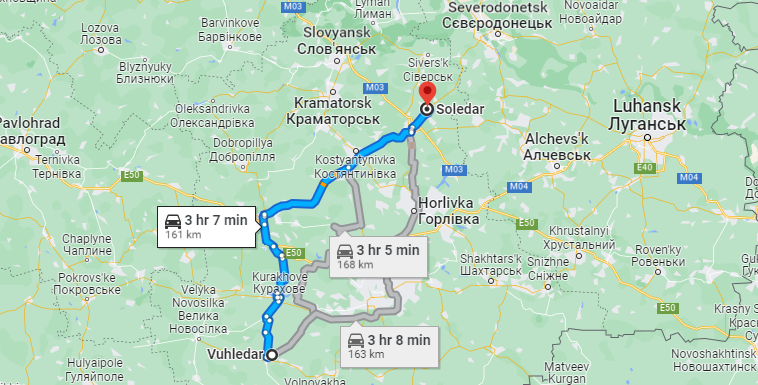
Some small settlements in that area have already been turned into a kind of medieval encampment; there are ten times fewer civilians in them than reservists. In this sector of the front (in a broad sense, throughout the Donetsk arc), the enemy has been building a line of defence for years which resembles in its configuration not even the Second World War, but in some places the First World War.
The defence line of the VSU north of Donetsk airport and the famous village of Peski has even officially been called the Big and Small Anthills – that’s because of the abundance of trenches and other fortifications. It was possible to clean up this ‘Ukrainian Verdun’ only last week, but right now the fighting is going on at the outskirts of these ‘anthills’ – in the villages of Vodyanoye, Opytnoye, and Pervomaiskoye.
There’s an idea circulating that the current battles on the Avdeyevka arc [дуга] are something unimportant and meaningless. In reality, this is not the case, and the enemy is clinging to these positions to the last for good reason. There, as well as on the Seversk– Soledar–Artemovsk line and further to Chasov Yar and the Slavyansk-Kramatorsk agglomeration, almost a quarter of the entire Ukrainian army has been pumped at the moment. And reserves are constantly arriving. So no one has terminated the spring task of destroying the VSU grouping around Donetsk and Avdeyevka. Not to mention the fact that this is the territory of Russia all the way to Slavyansk.
Another thing is that now there are no prerequisites for the encirclement of this grouping, and there is a classic passage through the enemy’s fortifications. And this is not only a purely military issue, but also a political one. There is no alternative to fighting for positions around Avdeyevka and for the Slavyansk-Kramatorsk agglomeration in the broad sense of the word. Not under any command nor under any strategic plan, whatever it may be.
Weather conditions will change the nature of tactics somewhat, but in general the situation will not change. Fighting in the DPR [Donetsk People’s Republic] is basic, fundamental, for which everything will be sacrificed. If you want, this is the quintessence of the special military operation. Such is the geography, with which you cannot argue. Be you even Suvorov [Marshal Alexander Suvorov 1730-1800], even Zhukov [Marshal Georgy Zhukov 1896-1974], but you will not be able to avoid the continuation of trench fighting in the arc from Maryinka to Seversk.
The enemy also needs a respite, especially since the five brigades of the Armed Forces of Ukraine, which have been pressing on Kherson, are now severely battered. In their condition, it’s quite impossible to take them and throw them somewhere else to organize some new offensive. They require additional equipment, rest and rearmament. So it’s simple — the VSU will be forced to take a break, despite the fact that there are rumours about an upcoming offensive in the southern sector.
There is euphoria in Kiev, and even the foreign advisers who manually manage the Ukrainian general staff cannot dissuade these people from further movements. At the same time, the need to constantly bring reserves to Chasov Yar reduces Kiev’s chances of forming a new offensive grouping.
Nevertheless, it is the southern direction which should be recognized as the most important. In Kiev they look at the map and see that the distance to the coast of the Sea of Azov (Berdyansk, Melitopol, and Mariupol) from the front line is about two hundred kilometres. That’s not far.
But in order to advance in this direction, the VSU must hang on to Ugledar. Ugledar is of critical importance for the VSU in order to try to develop an offensive against Mariupol from the north. Without controlling the Ugledar area, the VSU units advancing to the sea risk getting a stab in the back. That is why it is extremely important for the Russian troops, in turn, to clean up the approaches to Ugledar – the very settlements of Pavlovka and Novomikhailovka, even Maryinka. The occupation of Ugledar by Russian forces, or at least fire control over this zone, by itself prevents the possibility of a Ukrainian offensive to the coast of the Sea of Azov.
Although, given the euphoria in the minds of Kiev, they may well try to attack even with their flanks exposed.
Another option for the development of the winter campaign may be the organisation of a Russian offensive on a less than obvious sector of the front. Previously, a compensating counterattack in the Kharkov region was considered as such after the stabilisation of the front there. But on reflection, it is clear that this is too costly and risky. The enemy is exhausted in this area, but it is still unclear what its possible reserves are.
Another option can be considered on the southernmost flank, most likely in the direction of Zaporozhye. But not the area which the enemy considers as its possible springboard, but the territory from the Dnieper to Gulyai-Pole, where troops will be withdrawn from the other side of the river. This is possible, however, only after the end of the regrouping and the formation of new units from among the mobilised.
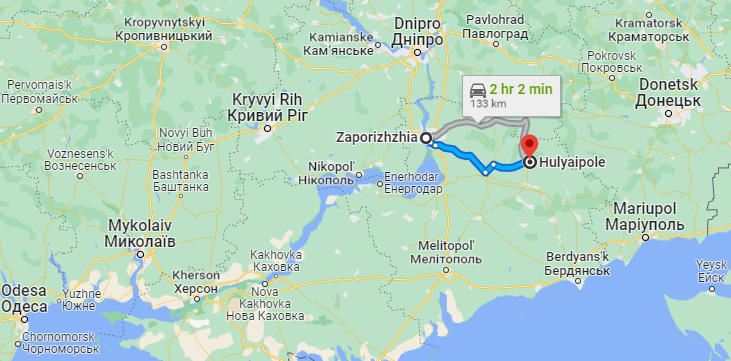
To be sure, all these scenarios can be implemented on condition that there are no unexpected changes in the terms of Russia’s strategic approach to the military action. So far, such changes are not visible. But in any case, the winter campaign will bear little to no resemblance to the summer-autumn one.
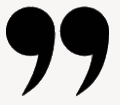


I think it is quite right to think that in the West, we the populace, have little idea of what is really going on in the war front and outside it, how is the war fought and how is it evolving, when the media are involved in quite a different thing. It is quite outstanding to notice, every day, how bad is the reporting by Western media not to mention the interpretation of events. We are to be kept ignorant for fear about public support for the war. This, keeping us ignorant about what is really going on, about how badly are things going in the battlefront for Ukrainians, how bad are the losses and the horrible state of Ukrainian economy turning into a sink of resources… will possibly end badly when at some point the perspectives that have been planted fail one after the other: Ukraine is not winning, energy is more and more scarce and expensive, jobs are lost and all the throwaway money and resources wasted won’t come to our rescue. The Russian aren’t those supposed inept and corrupt idiots, according to the propaganda. It is us who are the stupid, corrupt, inept idiots who took it wrong all this from its inception around 2014 by the neocons or whatever we can call these morons that designed this war.
Yesterday, talking with some friends of mine participating in courses on renewable energy installation, they were genuinely surprised when I talked about the grim perspectives of energy in Europe. How can that be? well… this little pulse showed me how ignorant we are kept on everything.
“The Russian aren’t those supposed inept and corrupt idiots, according to the propaganda. It is us who are the stupid, corrupt, inept idiots who took it wrong all this from its inception around 2014 by the neocons or whatever we can call these morons that designed this war.”
Why can’t we all be inept and corrupt idiots?
(Of course, sometimes you only need to be slightly less inept and corrupt than your opponent.)
Isn’t it amazing how people keep on saying that American imperialists are short-term thinkers?
Look at a series of world maps from 1950 to the present, and you will find a very considerable expansion of their sphere of influence. Look at how the EU obeys the Americans. Look at the expansion of NATO. Look at the permanent American presence in Mesopotamia.
Would anybody in 1972 have said that, in fifty years’ time, the American Empire would contest the Russians–for control of the Dnepr?
Some people say that the Saudis have recently been defying the USA. But compare this to the sort of defiance the Saudis could show in 1973.
Short-termism, huh?
Now if you want to say that the American Empire is a bad thing for the world, that’s quite correct (climate alone is proof). If you want to say that the American Empire has been a bad thing for most people in the USA, that’s undeniable.
Empires are ruled for the subjective benefit of their rulers, not for the objective benefit of their subjects.
But it makes little sense to claim that American rulers can’t play a long game. They didn’t become the richest, most powerful, most worldwide elite in all of history, merely by accident. It was either through the consistent exercise of their own will to rule, or through some sort of divine favour–take your pick.
It is good to realize the danger that the American Empire poses to all of humanity. It is good to oppose the American Empire. But it is bad to underestimate the rulers of that empire, no matter how ludicrous they might seem.
Rulers are always people worth laughing at. But the guys with powdered wigs and rouged cheeks can still rule over continents, and slay millions. In their vanity, they value most things little, while they mount astonishing efforts to attain their desire. The American Empire is the fruit of such astonishing effort. Great pains have been taken, and inflicted, to make such a thing as this. Try it now: laugh.
Huh? The US was half of world GDP at the end of World War II. Anyone with an operating brain cell could play that to advantage. Admittedly, American leaders then did set up a series of institutions that did help extend and preserve American influence. But the US has been running on brand fumes since that period.
That is utterly different than a country recently derided as having a GDP smaller than that of South Korea changing the world order.
The US share of world GDP was down to 1/3 by 1970.
OPEC countries succeeded in wresting control of their oil assets from the Seven Sisters and reducing them to service providers during the 1970s.
The US got lucky with USSR overextension. It was NOT due largely to US military buildup but to Russia getting into what amounted to a two front low grade conflict, with also being on a hostile footing with China at the same time. We didn’t gin that up.
The US is entirely responsible for the creation of our supposed biggest geopolitical rival, China. We pushed for their entry into the WTO when they did not qualify. We operated on the dopey ideological idea that if they traded with us, they’d become democratic and docile. The US elites and government were all on board with deindustrialization and the loss of critical US skills. They tolerated attacks on public school teachers and the resulting serious decay in test results and educational attainment levels (also the result of higher education looting in the form of student loans serving mainly to fund adminisphere bloat and gold plated facilities). They did little to nothing to stop Chinese intellectual property theft.
And I can go on about our bloated and not fit for purpose military, the supposed source of our might. That’s being exposed as a paper tiger.
Our big weakness is our elites, and this is replicated across the West.
WJ Clinton and his labor secretary Robert Reich wanted China admitted into the WTO. There seemed to be shenanigans at the time and what looked like possible quid pro quo. Clinton may have indirectly received campaign donations from China and later gave China access to sensitive satellite technology.
“As of two weeks ago, the 13-page report on the Chinese connection — part of a much larger document compiled by the Senate Governmental Affairs Committee on the conclusions drawn from last year’s hearings — was the subject of bitter dispute between the committee and the CIA and the FBI, which feared it would compromise intelligence-gathering. Both agencies now have agreed to the final draft formulation, although the Justice Department has raised unspecified last-minute objections to its release.
The report describes what it calls “strong circumstantial evidence” that six individuals with strong ties to the Chinese, including the Riadys, may have funneled foreign money into political campaigns during the 1996 U.S. election cycle. It singles out one of the six, California immigration consultant and longtime Democratic fund-raiser Maria Hsia, as “an agent of the Chinese government,” although it cites no specific actions taken in support of this alleged role.”
https://www.washingtonpost.com/wp-srv/politics/special/campfin/stories/cf021098.htm
https://www.nytimes.com/1998/05/18/us/clinton-says-chinese-money-did-not-influence-us-policy.html
good for you Yves!
Yeah but, ignore Roland completely at our peril.
After listening to Douglas Macgregor and Scott Ritter talk and trying to work out what the Russians are up to, I am going to advance an idea. I’ve said before that this is not a Ukraine-Russian war but a NATO-Russian war. I should expand that and say that it is really a Collective West-Russia war to count in other nations which are sending weaponry although not in NATO – countries like South Korea, Australia and New Zealand. When the Russian call-up was announced I assumed that this was to build up an attacking force that would leave their trenches and go after the Ukrainians in a final offensive. Well, maybe so, maybe not. The Russians have concerned themselves with excess troop losses and such an offensive would lead to a lot of killed and wounded which would be a break with the behaviour over the past nine months. So why would they do that?
Supposing that the Russians are really going to let the trends work in their favour instead and those extra troops are there mostly to bring their formations up to full strength and to make sure that there are no Ukrainian breakthroughs. But what the Russians are really doing is let time to work to their advantage. Sooner or later, the Ukraine as a country will collapse. It would have already except the west is propping it up but the approaching winter, lack of energy, lack of soldiers, hyperinflation, etc. is eating it away rapidly. And the Collective West countries? They are heading into recession and their sanctions are causing their own economies to scream. Sooner or later the cracks will get too wide and they will drop all support. This has started already. And the west is running out of money and weapons to send the Ukraine and they have already passed the point of diminishing returns. It’s hard to say exactly when this will happen but mathematics tells you that it has to happen. And when it does, those Russian troops will go mostly unopposed to wherever they decide to go as the Ukrainians retreat having no food, water, ammo or fuel.
Rev Kev you made some good points. The continued destruction of Ukraine’s electrical grid supports your theory. Alexander Mercouris repeatedly has opined that this is a War of Attrition and references the US Civil War and Vietnam War as examples. I think what is going to happen is that once Ukraine collapses totally, and most of the civilians have left, the Russians will sweep down from Belarus along the Ukraine western border completely isolating Ukraine. When that happens, the government will capitulate and the Ukraine army will surrender. Its just a question of mopping up after that. I can think of no other reason Russia would send a 1000 man HQ group to Belarus.
Bingo.
I suspect that Russia is working on depleting Ukraine’s logistical capability. Troops need food, fuel and ammo, especially fuel. Ukrainian front line is some 2,000-2,500 km long, so it can’t be held in strength in its entirety. With extra troops, Russia can attack through the soft points, as long as Ukraine lacks the ability (and supplies) to shift their forces along the frontline to meet each threat.
I think this is what we are seeing right now, systematic elimination of critical resources needed to keep the Ukrainian army supplied. Elimination of the electrical grid will not only reduce the carrying capacity of the rail network, but also reduce local capacity to sustain troops by providing food, etc. So, not only will fuel, food and ammo need to be shipped for the frontline troops, but food and fuel for the local population will start to eat away at the logistical resources.
Others (notably Christopher Lawrence) seem to be making this point. At this juncture the Russian leadership are fighting a War of Attrition. There is no more Russian “Shock and Awe” left, if it ever was their intention in the first place. The strategy appears to be bleeding “Ukraine” and the West slowly while strengthening ties with the “multi-polar” world economy, China and India in particular.
American generals keep pointing out that China is the “real” conflict. I think that the serial meetings between Scholz, then Biden, and Xi Jinping are critical in this regard. The official CCP readouts were very strong in stating that Germany and the U.S. need to stop with the chaos and threats.
If China starts imposing sanctions on Germany and/or the U.S. — possibly couched in terms of Zero-Covid shut-downs — it will create serious problems for their economies, in particular popular unrest as companies lay-off workers and consumer goods become scarce and can’t be replaced domestically. That would certainly put a crimp in the ability of the “West” to re-supply the “Ukrainians” and they will collapse.
It’s a very long game.
I think this is exactly right. I would like to add a few more things thatthat I’d been thinking lately pointing in the same direction.
1. Trained miltary professionals, especially in combat arms, are in short supply everywhere and they are irreplaceable in the medium term. But, if you are attacking, most, if not all, of your combat force will need to be professionals. Organizing a 300,000 man offensive force would require, I would guess,at least 100,000 military professionals and that seems high for a campaign lasting more than a few weeks and the likely casualties among them will be uncomfortably high.
2. I don’t think Russians had been mobilizing “combat capable” reservists reservists particularly. The rumors that I’d read (prob not too reliable, admittedly) have been thatthat they are calling up reservists with experience in support arms, and quite frankly, I don’t think there are enough recently experienced former military professionals from combat arms that could be called up if only because the pace of professionalization of the Russian military picked up only fairly recently–last decade plus, maybe two.
3. Given the great cost and difficulty with which their armee forces have been getting professionalized, Russians will not sacrifice them except when they feel the opportunity for quick decisive victory presents itself. Given the current trends, that may not even take place on a battlefield at all, as the war has transmogrified into a global Russia-NATO of mostly non-kinetic variety, with the hot war in Ukraine being a secondary theater.
I would go further, that maybe Russia wants to stretch this out a bit longer. This means giving the Ukrainians and the West a morale boost from time to time to keep them in a fight long enough for purpose, while your own troops are warm, well fed, etc. behind a very secure position. How else to denazify and demilitarize Ukraine? How else to erode Western morale so much over a cold hard winter that EU/NATO/US unity is broken, and the dangerous illusions of the neocons shattered? Russia has all the time in the world. It is its greatest asset.
I remain worried that the neocons will refuse to accept defeat and will urge use of the one weapon we have to turn the tide. Can we trust what Biden said to Xi on Nov. 14 (according to the White House readout):
I’m not sure that Biden and the neocons can be trusted on this score. If, after several months of further weakening of Ukraine and the NATO/EU alliance by General Winter, Russian forces make a major breakthrough, head West past Kiev toward Lviv, and take Odessa, that first of nukes by the U.S. is out of the question.
Even if the US/NATO commit unlimited resources to supporting Ukraine, there will be a steady deterioration of the quality of life and the value of Ukrainian assets as the infrastructure crumbles. This is a losing game for oligarchs and corporations with business interests in Ukraine. So the question is can the DC Neocon ideologues prevail against the business interests. The American plutocrats who funded the Neocons will have to find a way to tame the monster they created if they want to avoid further losses in Ukraine.
There is nothing especially Russian about retreating. When Kutuzov pulled off his plan, he did so in opposition to his Emperor, the high aristocracy, and his own commanders. He effectively had to fool and manipulate them to make it work. The idea of letting Napoleon go was his, and contrary to our Emperor’s intention of destroying him on our territory. Likewise, during WW2, we retreated not because we wanted to out of some guileful design, but because we were forced to. Our military’s preference, like any military’s preference, is to attack.
I would like to believe that our command does not want to waste lives needlessly. There is some precedent for that much in the Russian military tradition (Potemkin was concerned with that, for instance). However, the simplest explanation is that we are giving up ground because we cannot hold it, and not attacking because we would be unable to win. Of course, this kind of “defeat” is much better than forces being slaughtered or whittled down in untenable positions. Strategically, it is the successful avoidance of decisive defeat. It does not necessarily promise any kind of decisive victory. So far I have seen nothing to convince me that this would be anything other than a prolonged war of attrition, based on the somewhat vain hope of the other guys collapsing first. I’d be surprised if any country involved does collapse. That is not easy to achieve.
Make that “… unable to win while retaining an acceptable correlation of forces.” or something to that effect, and I agree with you completely. And since that correlation appears to be steadily shifting in your favor, I don’t think apparent inaction equates to stagnation.
There is indeed nothing particularly Russian about retreating. George Washington, for one, was brilliant at it. And while the recent headline-making retreats strike me as exceptionally well executed, I’m not convinced the withdrawal up by Karkhov was the carefully laid trap many see it as, so much as the Ukrainians recklessly advancing into the actual Russian defenses, perhaps having mistaken what amounted to a picket line for the real deal. That Russian defenses in that area were established in the way they seem to have been would, I think, be indicative that the troops were pretty thin on the ground. I’m led to wonder why that might be, and, if that were so, why the mobilization came as late as it did. SARS-2 and related miltary-political clusterifcation is my current pet theory.
That forces were thin on the ground everywhere, requiring both (partial) mobilisation and (partial) retreat to avoid a total collapse of the frontline, seems like widely-accepted wisdom here. Attacking with numerically-inferior forces is either brilliant or insane, but either way it leads to the problem that even on success, holding on to gains would be problematic. As for why this was done, I suspect that Putin’s instinct is to rock the boat as little as possible back home. Thus, he tried to wage war on the cheap rather than risk the disturbances inevitably stemming from mobilisation (far more dangerous to the political system than any sanctions, which if anything reinforce it instead). It reminds me of the British at the beginning of WWI a little bit, despite all the differences in political systems and traditions. Perhaps he also thought results could be achieved quickly, before the disadvantages of this approach make themselves evident. That clearly did not work out – hence the mobilisation.
Helmer makes this interesting reference to the poet Cavafy:
This reminds me of my favorite Cavafy poem, which I’ll set forth here because I believe it is so pertinent to this great moment of decision by the leaders of the world at this moment of history.
Are the leaders of the world capable of the great “Yes” — acknowledging (and acting upon) the conditions necessary for a stable peace?
That was just wonderful, Karl.
The human spirit pauses at the crossroads, which way to go…
“he goes from honor to honor, strong in his conviction”.
Ya. That.
Gee, I wonder if Russia commissioned a Rand Corp. study called “How to Overextend and Unbalance the U.S. and NATO?”
What I am annoyed about Russia is not the retreats…., and some other losses (i.e. Moskva ship) but the fact that they did little in these months to truly tenderize the Ukrainian reinforced lines facing Donetsk City and in that area. I heard about the “flamethrower” systems and the Father of All Bombs Russians purport to have and I think their use in these circumstances would be entirely justified, given the absence of civilians from these areas. What is going o? It is almost like the Russians want to drag this SMO on and on and on….
I’m a broken record on this topic, but neutralizing properly constructed modern defenses in depth is no simple task.Simply blasting them to smithereens is expensive in terms of ammunition and uncomfortably unpredictable in terms of outcome. If you miss anything the rubble you’ve created is likely to work to their advantage, making your infantry’s work more difficult and more dangerous. And until your guys root them out any enemy left will likely be busy, reconstructing their fortifications when they aren’t ambushing your patrols.